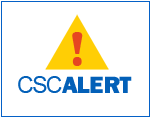What You Need to Know about Campus Emergencies
While most college community members consider Colby-Sawyer a friendly and safe campus, emergencies can and do occur here. The most common emergencies are weather-related—primarily due to major snow, ice and rain storms that can cause power outages, flooding and damage to campus grounds and facilities, and affect parking on campus.

The college has a new emergency communications system, CSC ALERT, and more than 400 community members have already signed up to receive instant alerts via text messages on their cell phones. Students, faculty and staff should take time to learn about the college's emergency procedures to ensure that they will know what to do when an emergency strikes.
“The most effective way for the college to reach the largest number of college community members is through text messages to cell phones. Students and employees may not always be on e-mail, but they generally have their cell phones with them,” says Director of Campus Safety Pete Berthiaume. “We will send out CSC ALERT messages rarely and only in case of true emergencies or critical and timely information.”
To create an account and register for CSC ALERT, login to Blackboard and click on the CSC ALERT tab along the top of the screen to see the Account Registration area.
Signing up for emergency alerts is just the first step in preparing oneself for emergencies, Director Berthiaume points out. “We can have the greatest communication system, but it isn't going to work unless people educate themselves about our emergency protocols and evacuation procedures. Emergency preparation is not an event—it's a process.
“It's got to be a collective, community effort in which individuals and groups are responsible for learning about and participating in emergency planning and preparation,” he explains. “It's not something Campus Safety or any one office or department can do on its own. We're in this together.”
It's Only a Drill—This Time
Campus Safety conducts evacuation drills in the residence halls each semester and will soon begin to practice them in other campus buildings to ensure that college employees, as well as students, understand and are able to follow the college's emergency protocols. Although the college has had emergency plans in place since the mid-1990s, Director Berthiaume says there's heightened awareness on college campuses today about the need to prepare for many types of emergencies.
“The college's emergency planning is ongoing and dynamic; we continue to hone our plans and response, and work with town and state officials and emergency personnel to make sure our plans dovetail and our efforts are well coordinated,” he adds. “We have placed booklets all around campus and in every classroom with our emergency protocols, and college community members should read and review them.”
It's critical that the college community learn the terminology of emergency communications so that they can follow directives to protect themselves and others, according to Director Berthiaume. The terms “shelter-in-place” or “campus, building or campus room lockdown” are used rarely and only in cases of extreme danger or an immediate threat.
When the community is directed to “shelter-in-place,” for example, people should stay inside their buildings, unless their particular facility is identified as “unsafe.” This directive would be used in situations such as extreme weather conditions or a public disturbance that has escalated into violence.
A “Room or Building Lockdown” directive is used when it may be more dangerous to evacuate the building than to stay in an assigned room. These terms are used only in rare and extreme situations, such as when a violent or potentially violent, angry or deranged person or persons pose an immediate and dangerous threat.
Common Emergencies: Not an Oxymoron
The most common emergencies at the college are weather-related—primarily due to major snow, ice and rain storms that can cause power outages and the loss of utilities (lights, heating, electricity, water), flooding and damage on campus. Less often, emergencies have occurred on campus due to chemical releases such as gas or propane leaks or spills.
During the winter of 2007-2008, notable for its cold weather and heavy snowfall, the college used its previous emergency alert system to good effect, says Director Berthiaume. “We were able to effectively communicate our efforts to keep people safe during last winter's storms,” he said.
A new CSC ALERT system, powered by e2Campus—the most widely used alert notification system on U.S. college campuses—was implemented this summer, and will be used similarly to keep the community safe and to convey critical and timely information. Those registered with the previous system, clearTXT, must now create a CSC ALERT account and register for the new alert service.
To create an account and register for CSC ALERT, login to Blackboard and click on the CSC ALERT tab along the top of the screen to see the Account Registration area.
“This is our primary tool for campus-wide emergency and urgent communications,” concludes Director Berthiaume. “It's our way of reaching most of the community, and it's a tool that can potentially save lives.”
To learn more about emergency plans, protocols and terminology, visit the Emergency Guidelines.
-Kimberly Swick Slover


